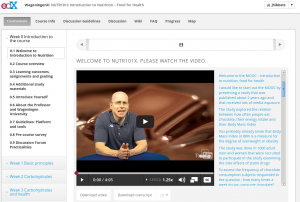 I recently completed my first MOOC (Massive open online course) through the EdX platform. The material for the Introduction to Nutrition course was provided by Wageningen University. I learned a lot about nutrition, the three macro-nutrients (proteins, carbs, and fat), and how the body breaks down food. Overall, I had a great experience with the MOOC.
I recently completed my first MOOC (Massive open online course) through the EdX platform. The material for the Introduction to Nutrition course was provided by Wageningen University. I learned a lot about nutrition, the three macro-nutrients (proteins, carbs, and fat), and how the body breaks down food. Overall, I had a great experience with the MOOC.
For our final exam, we were asked to critically assess the validity of a food or health claim and to argue in favor or against it. The specific requirements were:
- to describe a health or food claim of our own choice
- to critically analyze this claim and write a persuasive argument in favor or against the claim
- to support our arguments with scientific evidence
Since I took the time to write the essay, I thought I would share it here and get your thoughts.
Health claim: Sugar is a primary contributor to weight gain and causes obesity
Is sugar the main cause of obesity or is it the addition of sugar and the abundance of food products available to us the culprit? When I first started to hear claims like “sugar is the new tobacco,” my first reaction was that I had to find ways to reduce my sugar intake. And this caused me to start reading more and more food labels to help discover how much sugar was in the food I was consuming. The scary part—sugar is in a lot of products.
At first, I thought, sugar can’t be that bad, in occurs naturally in many of the fruits that we eat. Pineapples (9g), strawberries (7g), bananas (17g), apples (23g), and grapes (20g) all contain natural sugar. Source: Sugar Stacks
Then I started to understand the effects of increased sugar consumption. Over the last three decades, the consumption of added sugar has risen by almost 30%. What does that mean for our health and or weight? The Hungry for Change website also shares these interesting facts about sugar consumption:
- The average American consumes at least 64 pounds of sugar per year, and the average teenage boy at least 109 pounds.
- Americans consume 22 teaspoons of added sugars a day, teens 34 teaspoons.
This would lead one to believe that there is some correlation with the rise in obesity and weight gain and the increased consumption of sugar in our diets.
A group called Action on Sugar believes the “link between calories and obesity is caused in part by high sugar consumption, and that not enough is being done to tackle what they call ‘the obesity and diabetes epidemic.’”
The Sugar Association claims that sugar is not the cause of obesity. Instead, they claim that:
“Consuming more food (calories) than needed to maintain energy balance causes overweight and obesity. If you eat more calories than you need, from any source, weight gain is inevitable.”
Let’s consider what we’ve learned in our class about weight gain.
At a fundamental level, weight gain means that energy intake exceeds energy expenditure. This is also called a positive energy balance and we know that excess energy not used by the body for maintenance, growth, or physical activity is stored as body fat.
Comparing this knowledge with what the Sugar Association claims, reveals that their position on sugar causing obesity is not invalid. In fact, weight gain is caused by a positive energy balance. However, they fail to show the facts about the increase in sugar consumption as a potential cause of weight gain as we’ve seen above from Hungry for Change.
Robert Lustig, MD, a University of California San Francisco (UCSF) pediatric neuroendocrinologist, says in the article Sugar Is a Poison that “food was just as abundant before obesity’s ascendance. The problem is the increase in sugar consumption.” Lustig also states, “sugar both drives fat storage and makes the brain think it is hungry, setting up a ‘vicious cycle.’”
In a different article published in Men’s Journal, Dr. Lustig argues that “sugar is harmful in significant amounts – not necessarily because it’s high in calories but rather because it triggers a toxic chain of reactions in the body that produce harmful fats, hormones, and other metabolic by-products.”
To learn more about what happens when sugar (glucose) enters the body, read the following article How Our Bodies Turn Food Into Energy from the Group Health Foundation.
Conclusion
In conclusion, I believe that sugar is a main contributor to weight gain and obesity in today’s society. The current food environment promotes processed foods that contain high amounts of added sugar. We live different lifestyles with people being less active compared to previous generations. And the sheer abundance of high-sugar foods paired with strong psychology, emotional, and social desires makes it challenging for some individuals to choose healthy alternatives.
How can something as sweet as sugar ruin the lives of so many people and contribute to the obesity epidemic? Sugar has a powerful addictive effect on our mind and bodies and contributes to the vicious cycle referenced by Dr. Lustig. To solve the obesity problem, it’s going to take a combination of individual will power, better information, and perhaps government regulations.

